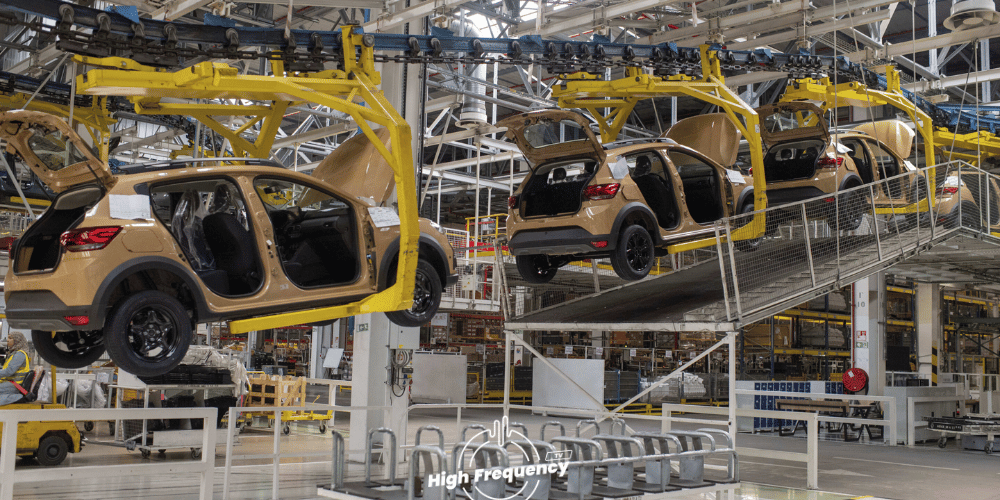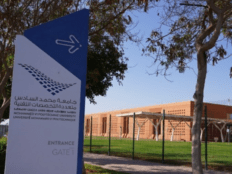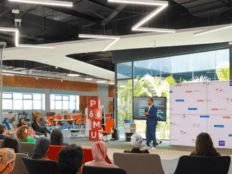A train traveling from rural northern Morocco to a Mediterranean port carries no passengers. Three times a day, it transports hundreds of cars, stacked bumper to bumper, from a Renault factory outside Tangier to ships that ferry them to European dealers. Business incentives and infrastructure investments, such as the freight train line, have grown Morocco’s auto industry from virtually nonexistent to the largest in Africa in less than two decades. The North African kingdom supplies more cars to Europe than China, India, or Japan, with the capacity to produce 700,000 vehicles annually. Moroccan officials are determined to maintain the country’s role as a giant in the auto industry by competing for electric vehicle projects. However, whether one of Africa’s few industrialization success stories can remain competitive as global auto production shifts to EVs and increasingly relies on automation remains to be seen.
More than 250 companies manufacturing cars or their components are currently active in Morocco, where the auto industry now accounts for 22% of gross domestic product and $14 billion in exports. French carmaker Renault, the country’s largest private employer, calls Morocco “Sandero-land” because it produces nearly all its compact Dacia Sanderos there. Unencumbered by many of the checks and balances of democracy, the government tells companies looking to outsource production to cheaper locations that they can obtain approval for new factories and complete construction in just five months.
Minister of Industry and Trade Ryad Mezzour said in an interview with The Associated Press: “Fifteen years ago, we didn’t export a single car. Now it is the country’s leading export sector.” Mezzour said Morocco has distinguished itself from other outsourcing destinations by expanding its ports, free trade zones, and highways. The government offered subsidies of up to 35% to manufacturers to set up factories in the rural hinterlands outside Tangier, where Renault now produces both Clios and Dacia Sanderos, Europe’s most popular passenger car, and will soon produce hybrid Dacia Joggers. Chinese, Japanese, American, and Korean factories make seats, engines, shock absorbers, and wheels at the Tangier Automotive City, a large campus of car manufacturers. Stellantis produces Peugeots, Opels, and Fiats at its factory in Kenitra. Allocating immense resources to develop and maintain an automotive sector that could employ a young and growing workforce was part of a 2014 industrialization plan. To create jobs, Mezzour and his predecessors focused on offering more than just cheap labor to foreign car manufacturers looking for new locations to build cars and produce parts. Major carmakers pay unionized workers in Morocco less than in Europe. But even with wages that are a quarter of France’s minimum wage of 1,766.92 euros ($1,911.97) per month, the jobs pay more than the median income in Morocco. The industry provides employment for 220,000 people – a small but significant part of the more than 200,000 agricultural jobs the country loses annually amid a six-year drought.
Like many African countries, Morocco’s domestic market for new cars is small. Last year, fewer than 162,000 vehicles were sold. However, the government’s success in building an automotive industry has made cars the spearhead as Morocco works to transform its largely agrarian economy. “My only simple priority is not export or competitiveness. My job is to create jobs,” said Mezzour. Abdelmonim Amachraa, a Moroccan supply chain expert, said investments in infrastructure and training skilled workers put the industry in a good position to attract investments from car manufacturers looking to expand their electric vehicle supply chains. Moroccan officials have sought investments from both East and West in an effort to attract industry leaders from China, Europe, and the United States while now racing to produce affordable electric vehicles on a large scale. China’s BYD – the world’s largest electric vehicle manufacturer – has at least twice announced plans to build factories in the country, which have so far stalled before they began. “The important question is what a small country can do in this world,” said Amachraa, pointing out how quickly the global auto industry was changing. “We have the ability to coexist with Europe, Africa, and the United States when there is no connection that can be found between China and the United States.” As Europe works to phase out combustion engines over the next decade, carmakers like Renault are preparing for adaptation in Morocco. Mohamed Bachiri, the director of Renault Group in the country, said the company’s track record in Morocco makes it an attractive destination for others to invest, especially in EVs. He said the industry is likely to continue growing because Morocco’s “integration level” – the percentage of parts that carmakers can source domestically – has steadily risen to over 65%. The country also has a competitive advantage due to its experienced and skilled autoworkers, which some other outsourcing destinations lack, Bachiri said. “We are inclined to produce cars for customers in our sphere. And the day they decide they need electric vehicles, we will do that,” he said. The government has funded public-private partnerships, such as an academy managed by Renault, to train technicians and managers. Compared to similar markets, Morocco’s political climate and proximity to Europe make it a safe investment, Bachiri said. “It’s like being on an island next door,” he said, pointing to the instability in neighboring countries in North and West Africa. However, as the United States and European countries encourage their carmakers to “onshore” electric vehicle production, it is unclear how Morocco will fare. The country has always prided itself on being a free market economy that avoids tariffs and trade barriers but finds itself in a difficult position as countries compete for EV production benefits and implement policies to protect their domestic auto industries. Western governments that have long urged developing countries to embrace free trade are now implementing policies to boost their own EV production. France and the United States last year introduced tax credits and incentives for consumers who buy electric vehicles made in Europe or North America, respectively. Although U.S. incentives may extend to Morocco because the countries share a free trade agreement, Mezzour said they complicated the global supply chain and sometimes made his job more challenging. “We are living in a sort of new era of protectionism,” Mezzour said. “We live in instability regarding trade rules, which makes it more difficult for countries like Morocco that have heavily invested in open, free, and fair trade.”
The Independent






Add comment